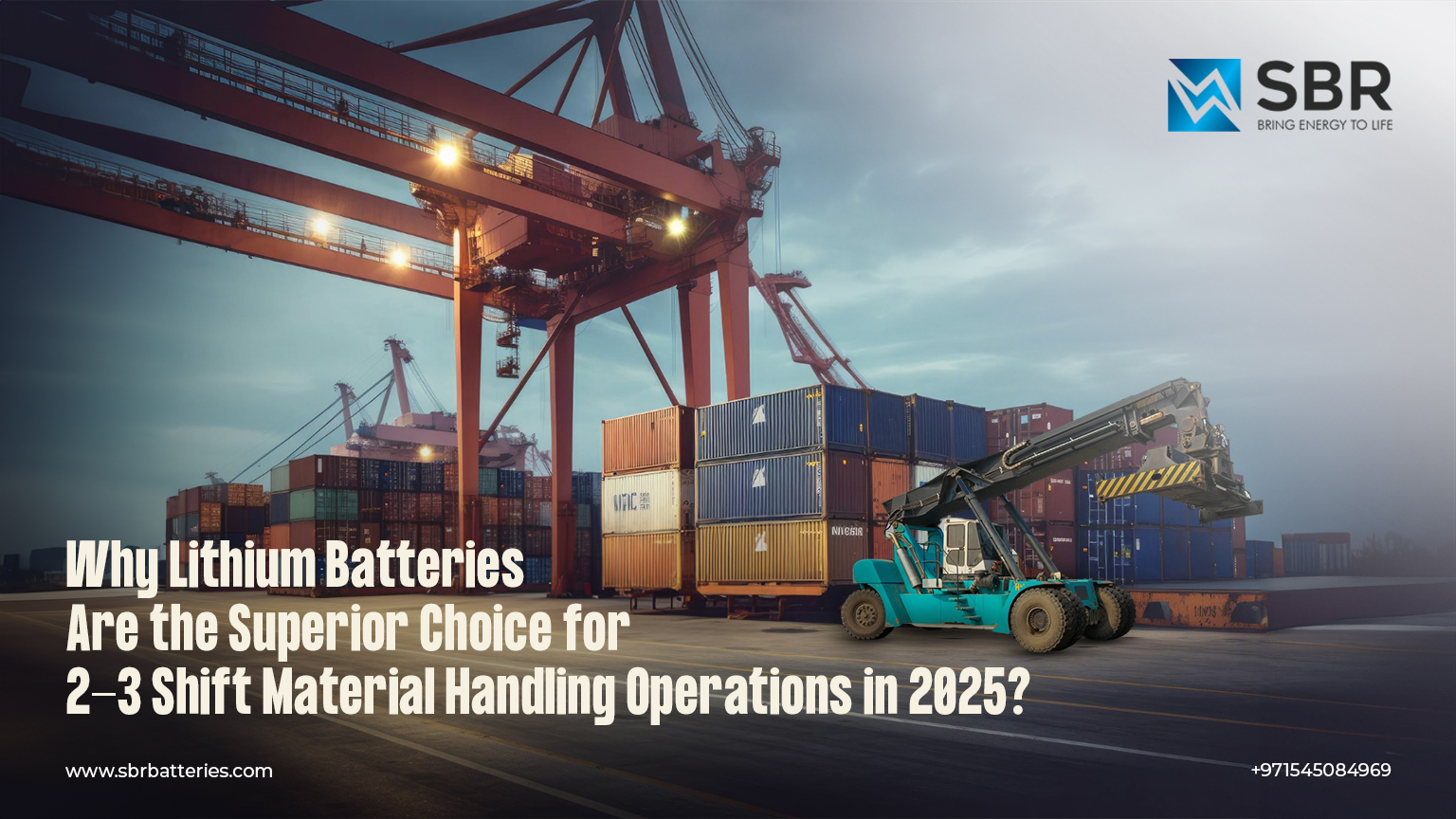
Why are Lithium batteries the Superior Choice for 2-3 Shift Material Handling Operations in 2025?
Material Handling is and will be one of the major foundations in modern industrial management like warehouses, distribution centers, manufacturing houses, and more. In modern times, lithium batteries have become an integral part of everything electrical that runs on batteries, this can be from forklifts to ground support equipment. Battery suppliers in UAE, like SBR Batteries, have stood at the helm of delivering innovative battery models to numerous businesses.
Businesses that run on 2 – 3 shifts must tap into an uninterrupted flow of power, and companies are relying on batteries, especially lithium-ion batteries, that are pulling industries into great lengths and heights. Historically, lead-acid batteries have been the go-to choice for a long time now but lithium-ion batteries are catching up and exponentially growing in user base thanks to their recyclability, rechargeability, and overall versatility.
Why Lithium Ion Batteries are Just Better
Reduced Charging Time
In today’s industrial landscape, downtime is a big issue, especially in 2 – 3 shifts. The time for charges is a waste, and it is guaranteed to negatively impact productivity. Lead acid batteries are notorious for their charge time of 6 – 8 hours. Additionally, businesses should look out for a cooling time of roughly 6 hours, which can be detrimental to smooth production. When work is progressively conducted in shifts, charging downtime should be independent of a seamless workflow; therefore, lithium-ion batteries can lend a hand. In general, lithium-ion batteries can be charged in a fraction of the time lead acid batteries. A mere 1 – 2 hours can charge the batteries. Opportunity charging is a game changer, i.e., workers can charge these batteries seamlessly in break time, eliminating almost all need for battery swapping or additional battery packs.
Extended Battery Life and Durability
When it comes to 2 – 3 shifts, battery life becomes crucial, and durability couples it to give out excellence in the workstation. When comparing lead acid batteries to lithium batteries, one can clarify without a shadow of a doubt that the latter offers exceptional durability when compared to the former. Battery suppliers in the UAE are showcasing the exceptional battery life of lithium-ion batteries to industries. Usually, the charge cycle of lead acid batteries is 1200 – 1500; this translates to roughly 2 – 3 years, which is mediocre at best when used heavily. For long-term usages, life degrades with regular deep discharges. On the contrary, Lithium-ion batteries are guaranteed to last around 3000 charge cycles, which translates to 4 – 5 years at a minimum. This doubling of lifespan can be transferred into an effective workflow. Compared to its counterpart, these batteries provide and maintain consistent output over the years. This ensures optimal performance in shifts.
Cost Effectiveness
Maintenance cost is a killer of progress and productivity. When it comes to two of the batteries, lead acid batteries require frequent watering, and cleaning is integral to avoid sulfation, which can be fatal to batteries. As we are dealing with chemicals that are hazardous to human beings, maintenance of lead-acid batteries can sometimes be harmful.
Maintenance is minimal to none in the case of lithium-ion batteries; there is no need for frequent cleaning and watering; this is absolutely crucial for 2 – 3 shifts and to avoid workflow interruption.
Impressive Energy Efficiency and Operating Cost
Electricity cost has immense weightage on operational shifts and can impact profitability. Comparing lead acid batteries to lithium-ion batteries, the former may lose 30% of its energy when charged. Conversely, lithium batteries boast a whopping 98% efficiency and consume far less electricity per charge which in turn gives better energy savings in the long run.
Enhanced Storage Options
In multi-shift businesses, space can often be a commodity that could be hard to find; therefore, smaller form factors are the way to move forward. SBR offers perfectly compact and superbly efficient energy solutions.
The requirements for proper ventilation and dedicated changerooms for the release of hydrogen gas are mandatory to maintain the lead acid batteries; this in itself can be a big turn-off because it takes up lots of space. The valuable floor areas could have been allocated for more efficient ventures.
Lithium-ion batteries are game changers on this front because, just like your smartphones, these could be charged from anywhere at any time, which is guaranteed to eliminate all need for a separate room to charge the battery.
Real Life Pros
Let us imagine a facility with more than 3 shifts and 20 forklifts, upgradation of more than 20+ batteries is eliminated with lithium-ion batteries, which is critical in order to cut on expenditure costs.
In 2025, especially when energy prices are soaring, and the cost of raw materials is as high as ever before, it’s always advisable to switch to more efficient, productive as well as cost-effective methods for a seamless business venture.
Conclusion
For a typical 2 – 3 multi-shift workflow, lithium-ion batteries are the clear winner when it comes to uninterrupted productivity. Businesses like warehouses and factories are long-term; therefore, as a long game, they need power sources that are reliable, efficient, and cost-effective. With negligible downtime and minimal maintenance, lithium-ion batteries can act as great vehicles. As one of the best lithium battery suppliers in the UAE, SBR Batteries is destined to help you with all your battery needs. A reliable partner is always better than discounted prices, which can cause frequent disruption to workflow.
We hope this blog will help you to make an educated decision when purchasing batteries for your business. To talk to our experts for your queries, call +971545084969 or leave an email at surjith@sbrbatteries.com.
